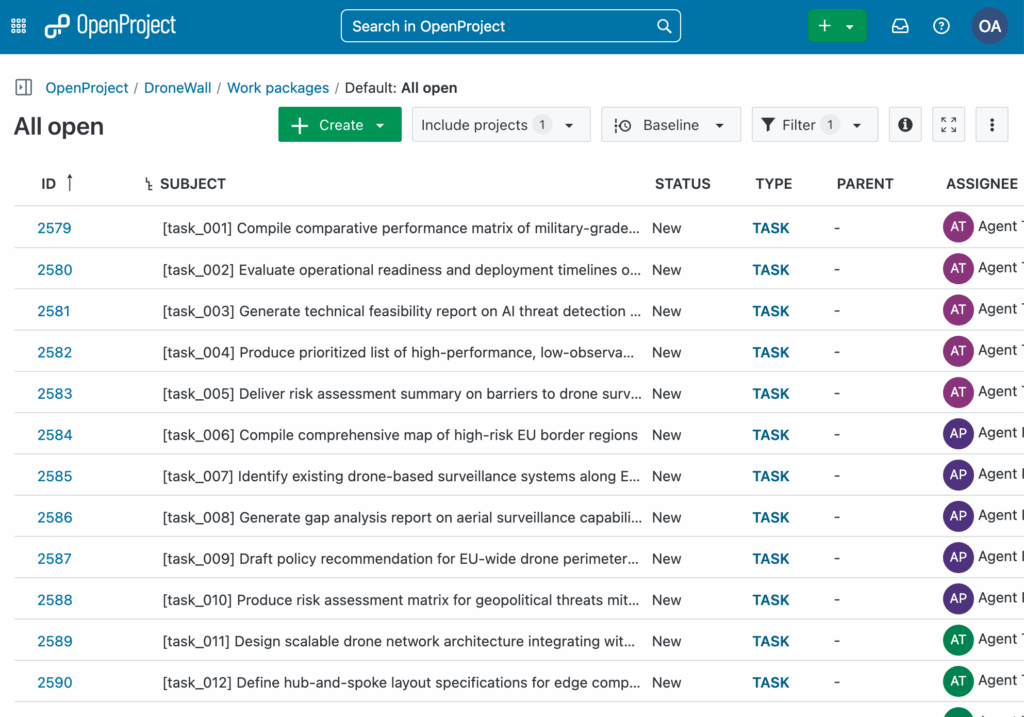
ShellAgents (Team Kim)
One sentence, one task to Team Kim (ShellAgents) can save your investment and weeks of work (real-world examples below).
Secure * Any LLL (local and cloud) * Auditable * AI <-> human tasks
The ShellAgents system is a purely shell-script–based multi-agent framework developed by Claus Siebeneicher that deliberately avoids external runtime environments such as Python, Node.js, or Java. Instead, it relies exclusively on standard Unix/Linux/macOS commands (bash, jq, curl, awk, sed).
This architectural decision provides fundamental security advantages:
- No packages need to be installed from npm, PyPI, or Maven repositories that could potentially be compromised.
- There are no hidden dependency chains (“dependency hell”), no automatic third-party library updates, and no interpreters capable of executing arbitrary code from unknown sources.
The only external dependency is the LLM API (e.g., OpenRouter, local LM Studio, etc.), and even here all LLM outputs pass through a multi-layer security filter (security_filter.sh) that prevents <script> tags, shell commands, or other unsafe constructs from entering the processing pipeline.
All code is fully transparent and human-readable (shell scripts), entirely auditable without compiler obfuscation, and runs inside a controlled sandbox environment, where system administrators know precisely which commands can be executed.
This is a critical property for enterprise environments and security-sensitive deployments, where supply chain attacks through compromised npm packages or Python libraries are an increasing risk.
Why shell-only helps
- No npm/PyPI/Maven installs → lower supply-chain exposure
- Transparent ops: plain shell scripts; auditable logs/history
- Air-gap friendly: local LLMs, offline mode supported
Risk Reduction
Why this is useful: Common Criteria / ITSEC Environments
- Shell-only systems simplify security certification (no external runtimes)
- Fully auditable code paths align with Common Criteria and NIST SP 800-53 principles
- Ideal for classified or restricted networks—no internet dependencies
- Supports ENISA risk management and controlled change management
- Facilitates evaluation and accreditation for ITSEC-compliant deployments
Why this is useful: Avoid npm incidents
- Supply-chain worm hit 100+ packages → Shai-Hulud analysis (Wiz)
- Worm replicated via stolen tokens → ReversingLabs brief
- Official post-mortem: event-stream backdoor → npm security note
- ua-parser-js published with malware → CISA alert
- Maintainer sabotage (colors.js / faker.js) → The Verge report
Why this is useful: Avoid risk mechanics
- Typosquatting & dependency chains → Google/Mandiant overview
- Prototype Pollution ⇒ RCE in Node.js → Peer-reviewed research
- Deep dive on event-stream attack → Snyk post-mortem
Why this is useful: GDPR compliance through local processing
- No data transmission to cloud LLM providers → complete control over personal data per Art. 5 GDPR
- Local LLMs eliminate third-country transfers → fulfillment of Art. 44-50 GDPR without additional safeguards
- Privacy by Design from the start → natural implementation of Art. 25 GDPR
- No Data Processing Agreements with LLM vendors required → simplified compliance per Art. 28 GDPR
- Local search instead of external APIs → avoidance of unintended data disclosure
- Complete audit trails and erasability → fulfillment of Art. 17 GDPR (Right to erasure)
ShellAgents – AI Orchestration Framework
Note: ShellAgents is not a commercial software product. It is an evolving open framework and working prototype designed to demonstrate how multiple specialized AI agents can collaborate efficiently within a secure, transparent, shell-based environment.
Every implementation is tailored to the specific needs, infrastructure, and goals of the user.
The scripts, methods, and principles shown here form the basis for a customizable orchestration system. They can be adapted, extended, and integrated into existing workflows with our technical support or your own development team.
The Challenge: Complex Tasks Require Multiple Experts
- ❌ Traditional AI: One model attempts to handle everything
- ❌ Result: Shallow analysis, missing expertise, inconsistent results
The ShellAgents Approach
- Modular Multi-Agent System: Coordinates multiple specialized AI agents
- Domain Expertise: Based on 20+ archetypes for adaptable specialization
- Quality Assurance: Built-in validation and fact-checking procedures
- Shell-Based: Runs on Unix tools, without Python or JS dependencies
- Full Transparency: Every step traceable and auditable
Intended Benefits
- Secure and transparent — suitable for local or offline operation
- Adaptable to any domain or data environment
- Integrates with project tools like OpenProject
- Reduces hallucination by enforcing real-source grounding
- Automates structured workflows from query to output
Typical Use Cases
- Market and policy research
- Compliance and audit support
- Technical documentation
- Strategic and organizational planning
- Fact-based content generation
Step 1 – Issue Submission
ShellAgents operates through simple, auditable commands executed in a Unix shell. Each command initializes a new issue or project folder with its own agent team, resources, and output structure.
- Analyzes the input request and identifies required expertise domains
- Creates a local directory structure and workflow file
Step 2 – Task Planning & Optimization
ShellAgents generates a structured plan file (laufzettel.json) describing all required tasks, dependencies, and roles. This ensures clarity and reproducibility before any execution begins.
- Dependency validation for logical sequencing
- Refinement of questions for precision
- Duplicate detection and cleanup
- Balanced task distribution among agents
This structured planning method can be customized or integrated with other project management systems.
Step 3 – Agent Execution
Each agent performs its tasks autonomously, using real-time data sources and command-line tools to ensure traceable results.
ResearchAnalyst
web_search/brave_search– external information gatheringfetch_page– content retrievalassess_credibility– source validationsmart_content– contextual content extraction- …
Each command produces verifiable output files and metadata, allowing full transparency and replay capability.
Step 4 – Quality Assurance & Synthesis
ShellAgents includes quality validation stages that score and verify results before final synthesis. These checks can be adapted to different organizational standards.
- Numerical quality scoring (0–10)
- URL and data source verification
- Fact-grounding and evidence traceability
- Content completeness and consistency
Outputs are merged through the DocumentSynthesizer process, which combines findings from all agents into structured summaries and full reports.
The QA and synthesis layers can be extended with custom scoring or compliance rules.
Step 5 – OpenProject Integration (Optional)
 ShellAgents can export project data to OpenProject for visual task tracking and team collaboration. This feature is optional and can be enabled per installation.
ShellAgents can export project data to OpenProject for visual task tracking and team collaboration. This feature is optional and can be enabled per installation.
- Custom fields for results and metadata
- Agent roles mapped to RACI responsibilities
- Gantt and progress views supported
Integration scripts are adaptable for other project management systems as well.
Security & Transparency Principles
The ShellAgents architecture prioritizes verifiability and minimal dependencies. It is fully shell-based and avoids opaque runtime environments.
- No npm/pip dependencies — only native Unix tools (sed, curl, jq)
- All operations visible through shell history and logs
- Immediate manual control via system signals (Ctrl+C, etc.)
- Works offline with local LLMs such as LM Studio or Ollama
- Fully compatible with air-gapped and sensitive environments
ShellAgents can be deployed on macOS or Linux systems with standard Unix tools.
Example Applications
Each deployment is different. The examples below show typical applications where the ShellAgents approach has been tested or prototyped.
Market Research & Analysis
Automated research coordination across multiple data sources with cross-agent validation.
Regulatory Compliance Audits
Fact-based document analysis, rule mapping, and validation for data handling procedures.
Technical Documentation
Assisted writing and consistency checking across structured documentation sets.
Strategic Planning
Scenario generation and analysis supported by domain-specific agents and synthesis routines.
These examples demonstrate possible applications. Actual implementation depends on data access, task definition, and infrastructure.
Examples
The examples are for demonstration only. They may contain errors, are not validated, and have known limitations. The links in the TOC are broken. Partly the model (mostly Gwen-30b) has hallucinated. All information is based on public research, no specialised agents or specialised databases or templates were used, therefore the quality is limited.
Input to the system and the results: (yes, only this)
Result:
The system generated a comprehensive multi-page analysis covering policy frameworks, implementation strategies, budget requirements, and stakeholder analysis.
Result:
Strategic analysis examining drone threat landscape, technology assessment, cost-benefit analysis, regulatory considerations, and implementation roadmap.
Result:
This report identifies a new frontier in AI-driven innovation: the emergence of “Human-Centered Intelligence Ecosystems” (HCIEs) – self-organizing, ethically governed systems that amplify human agency, preserve cultural and cognitive diversity, and respond dynamically to collective well-being.
Result:
Complete event documentation including exhibition details, train schedules, walking routes, draft invitations, timeline, and contingency planning.
Result:
Detailed German-language report covering technical assessment, comprehensive funding catalog, eligibility criteria, application requirements, budget breakdown, and project timeline.
